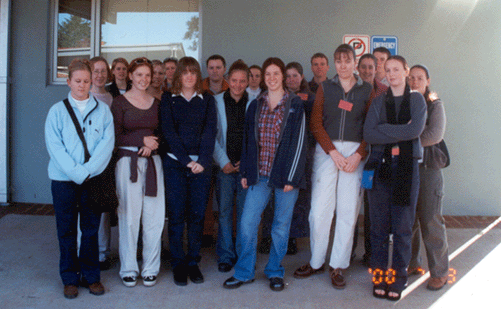Commission WEBSITE: Healthy Community Projects
Rural Health examples
Coming Home
Workshops On Rural Careers In Health For Year 10 Students
The Remote and Rural
Training Unit in Dubbo NSW has taken a proactive approach to two familiar
problems that face small rural towns: the departure of young people from
country towns and the inability of these towns to attract and retain health
care workers. It is well documented that there are severe shortages of
trained health professionals in remote and rural regions throughout Australia.
Studies in Australia and overseas indicate that professionals with a rural
background are the ones most likely to return to the country to practice
after training. Students from country areas, however, are under-represented
in health-related courses in universities and other training institutions.
Aims
The Rural Schools
for Health Careers Workshop is one of the core activities of the Remote
and Rural Health Training Unit. It encourages Year 10 students from north-west
New South Wales to consider a career in health. The fundamental aim of
the workshops is that many of the students attending will ultimately decide
upon a career in health.
Participants of the July 2000 Fourth Annual Rural Schools for Health Careers
Workshop held in Dubbo. Armed with enthusiams and trick questions for
health professionals on their tour of the Dubbo Base Hospital.
What the Program does
The workshop is a
five-day residential held in Dubbo. It provides information and a positive
experience to encourage the student's interest while promoting the benefits
and diversity of a career in health. It is hoped that a percentage of
students who choose a career in health will ultimately return to a rural
or remote area once they are qualified thus providing rural areas with
health professionals who have a strong affiliation with rural life.
Currently the project
is available to students from both public and private schools in the Macquarie
and Far West Area Health Service areas of NSW.
The Program has been
running since 1997. Approximately 20 Year 10 students attend the workshop
each year. The participants come from communities such as Bourke, Coonabarabran,
Dubbo, Gilgandra, Narromine, Walgett and Wellington.
The students were
interested in a diverse range of health career areas such as:
- diversional
therapy
- massage therapy
- rehabilitation
counselling
- medicine
- nursing
- osteopathy
- paramedicine
- psychology
- speech pathology
- naturopathy
- nutrition
- chiropractic
- pathology
- radiography
- medical research
- nuclear medicine
- occupational
therapy
- dietician
- physiotherapy
- sports medicine
- dentistry
The Program also
involved current university students from various regional areas speaking
to the participants about their university experience.
What makes it successful
Although a comprehensive
study needs to be carried out, one indicator of the success of this program
so far, is that 10 previous participants of the program were accepted
into Medicine in 2001 - an outstanding achievement for country scholarship
and hard work.
Nevertheless other
signs of success can be measured.
Due to the
nature of the residential workshop and the intensity of the five-day
Program the Training Unit staff have been able to develop a close
relationship with workshop participants. This enables us to give specific
support tailored to each individual and creates a relationship where
students feel free to approach the Training Unit staff and other health
professionals both during and outside the workshop. Following the
workshop we have been able to directly approach participants to inform
them of opportunities available which would enhance the likelihood
of them successfully gaining entry into a health career. This year
we had significant numbers of the participants returning to the Unit
for assistance with the arrangement of Year 10 work experience
(Report
and Evaluation of the Rural Schools for Health Careers Workshop, 1999
Evaluation, page 7).
Difficulties encountered
One problem experienced
is that the Program is conducted during school holidays. The students
are expected to devote half their holidays to the workshop. However, student
reluctance has largely been overcome by providing an active social program
during the evenings. This includes sporting activities and events like
going to the cinema and dining out.
Funding sources
The Remote and Rural
Health Training Unit receives a grant from the Rural Doctors' Network
which enables the Program to fully subsidise student attendance.

